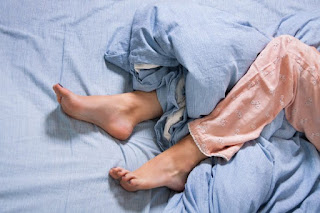Well, on the one hand, there is a scientific answer to that question. It's not the most obvious and straightforward answer but it is in fact correct.
What is very surprising to me (and many others) is how people do not want to believe that the scientific answer is correct. They have a much harder time accepting it than they would if someone told them that sleep paralysis was real.
It's almost like people would rather believe in an incorrect and false answer than to accept the correct one. The reason for this is obvious: the correct answer feels scary because it raises existential questions about how we live our lives.
The scientific answer is that sleep paralysis is not real. It doesn't exist. There's no such thing as an entity that attacks us while we're asleep and immobilizes our body. It just doesn't happen like some people think it does.
When we think that we are experiencing sleep paralysis, what is really happening is a mix between our perceptions and our interpretation of those perceptions.
In other words, when we think that we are experiencing sleep paralysis, what is really happening is that our brain has a perception and then it interprets the perception in a certain way. The interpretation of the perception creates an experience.
Is sleep paralysis real? Perhaps not unlike other paranormal phenomena, it is a fact that the phenomenon of sleep paralysis is often misidentified. I believe this occurs for various reasons. First, most people are simply unaware that such a thing exists. Second and more importantly the relevant expert community has yet to reach an agreement on what precisely 'sleep paralysis' entails.
As far as I can tell, sleep paralysis is a condition where the subject experiences complete physical paralysis while hallucinating that they are still conscious. In other words, during an episode of sleep paralysis one will believe themselves to be awake and aware when in fact their body has fallen asleep and stopped moving.
Such a hallucination is not unusual. The human brain has evolved to be highly adept at detecting the presence of predators in the vicinity, and one such mechanism involves chemically inducing hallucinations when something appears too risky or potentially threatening. In other words, it is quite normal for most people to experience vivid dreams that they believe are real while they sleep.
In addition, it is also not uncommon for people to experience hallucinations when they are falling asleep or waking up. This is due to the fact that we live in a holographic universe where reality is defined by consciousness. If you were able to place your hand through this table as if it weren't there, then our consensus reality would be changed and everyone else may see the table as gone.
Therefore, what most people describe as sleep paralysis is actually a hallucination caused by the brain misidentifying another person or object as a threat to survival.
What if they are not hallucinating? What if it is all real and in addition to being paralysed they can also see ghosts, spirits or even aliens? Well first of all, I would point out that this is likely due to a mass psychosis. I find it hard to believe that everyone who experiences sleep paralysis is actually seeing the same thing.
What is sleep paralysis? Is it a real phenomenon or just a myth? There has been much evidence discovered in recent years from studies and research that suggests that sleep paralysis is indeed, real. However, there are still some who believe that this phenomenon does not exist as well. I will first give the explanation of what happens to cause sleep paralysis before evaluating whether it really exists or not.
Sleep paralysis can be defined as a state during your dream where you are aware of the fact that you are dreaming, but are unable to move or speak. You might also experience hallucinations or complete body paralysis. It is usually associated with REM sleep and occurs when one wakes up from a deep sleep too quickly.
Scientists have conducted sleep studies on both humans and animals, in order to find out more about the occurrence of sleep paralysis. People who experience this phenomenon indicate that it usually happens when they are going back to sleep after waking up during a dream. It is also reported that people who suffer from narcolepsy experience hypnagogic hallucinations before falling asleep or while they are still awake.
Studies show that people who experience sleep paralysis have a higher level of carbon dioxide in their blood. Some scientists suggest that this phenomenon happens when the body is still in the REM stage and cannot go into deeper sleep, which causes hallucinations.
That said, sleep paralysis is a very real phenomenon and not just a myth. It has been proven that it exists with various studies conducted by scientists on people who experience sleep paralysis as well as those who do not.
In conclusion, sleep paralysis is a very real phenomenon and it does not only exist because of hallucinations or myths. It has been proven by various studies conducted on humans that it is indeed a real occurrence.


No comments:
Post a Comment